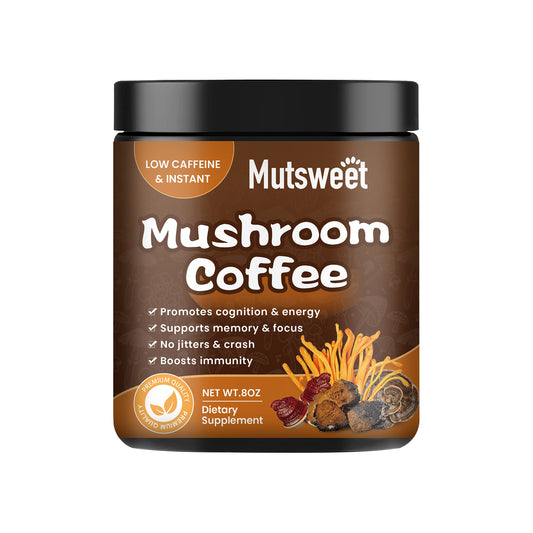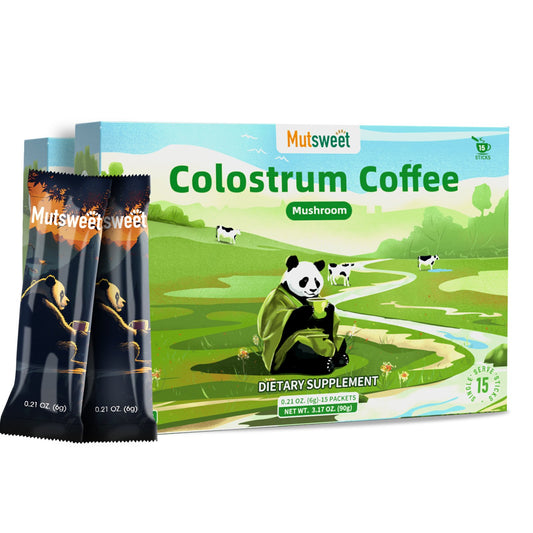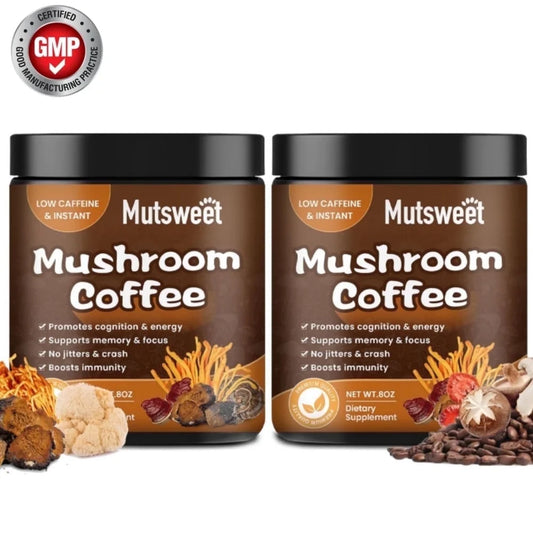As the back-to-school season approaches, both students and parents face the challenge of adjusting to new routines. Amidst the hustle of school supplies and class schedules, one crucial aspect often overlooked is nutrition. Maintaining focus and energy throughout the school day is vital for academic success, and the right dietary choices can make a significant difference.
Proper nutrition doesn't just fuel the body; it powers the mind. From boosting cognitive function to sustaining energy levels, what we eat directly impacts our ability to concentrate and stay alert. This is especially important for students, who need sustained mental clarity to excel in their studies. At Mutsweet, we understand the importance of nourishing the body and mind, which is why our products are designed to provide the nutrients necessary for optimal performance.
In this article, we'll explore the role of nutrition in enhancing focus and energy, highlight the best foods to incorporate into your child's diet and share practical tips for creating balanced meals that support a successful school year. Whether you're packing lunches or planning breakfast, these insights will help ensure your student is equipped to tackle the challenges of the classroom with energy and enthusiasm.

The Role of Nutrition in Cognitive Function and Energy Levels
Nutrition plays a pivotal role in cognitive function and maintaining steady energy levels throughout the day. The brain, like the rest of the body, requires a consistent supply of nutrients to function optimally. Certain foods can boost brainpower, improve focus, and help sustain energy, making them essential for students who need to stay sharp during long school days.
Key Nutrients for Focus and Energy:
- Complex Carbohydrates: These provide a steady source of glucose, the brain's primary fuel. Unlike simple sugars, complex carbs found in whole grains, fruits, and vegetables release energy slowly, preventing spikes and crashes in blood sugar levels.
- Proteins: Protein-rich foods like eggs, nuts, and lean meats are crucial for neurotransmitter production. These chemicals transmit signals in the brain, influencing mood, energy, and focus.
- Healthy Fats: Omega-3 fatty acids, found in fish, flaxseeds, and walnuts, are essential for brain health. They support memory and cognitive function while also providing long-lasting energy.
- Vitamins and Minerals: Iron, magnesium, and B vitamins play a significant role in energy metabolism and brain function. A deficiency in these can lead to fatigue and impaired concentration.
Incorporating these nutrients into daily meals can help students maintain focus and energy throughout their school day. Starting the day with a balanced breakfast, for instance, can set the tone for sustained mental clarity and physical stamina. A breakfast rich in complex carbs, protein, and healthy fats—like a smoothie made with Mutsweet Mushroom Powder, oats, and nuts—can provide the perfect combination of nutrients to fuel a productive day.
The Science Behind Focus and Nutrition:
Research has shown that certain foods can enhance cognitive function. For example, studies suggest that omega-3 fatty acids are linked to improved memory and learning abilities, while antioxidants found in fruits and vegetables protect the brain from oxidative stress. Foods that are high in these nutrients not only support overall health but also improve the brain’s ability to process information, solve problems, and retain knowledge.
Mutsweet Mushroom Powder is formulated to support brain health and energy levels. By including our nutrient-rich products in your child's diet, you can help them maintain the focus and energy needed to excel in their academic pursuits.
Top Foods for Boosting Focus and Energy
Incorporating the right foods into your child's diet can make a significant difference in their ability to concentrate and maintain energy throughout the school day. Here are some top foods that are not only nutritious but also effective in enhancing cognitive function and sustaining energy levels.
- Oats
Oats are a fantastic source of complex carbohydrates, providing a slow and steady release of glucose, which is essential for brain function. Starting the day with a bowl of oatmeal can keep your child’s energy levels stable, helping them stay focused during morning classes.
- Berries
Berries like blueberries, strawberries, and raspberries are rich in antioxidants, which help protect the brain from oxidative stress. These antioxidants have been shown to improve memory and cognitive function, making berries a perfect snack or addition to breakfast.
- Eggs
Eggs are a great source of choline, a nutrient that is vital for brain development and function. Choline helps in the production of acetylcholine, a neurotransmitter that plays a crucial role in memory and learning. Including eggs in your child’s breakfast can give their brain a powerful start to the day.
- Fish
Fatty fish like salmon, mackerel, and sardines are packed with omega-3 fatty acids, which are essential for brain health. Omega-3s support cognitive function, improve memory, and reduce inflammation, all of which are critical for maintaining focus and energy.
- Leafy Greens
Leafy greens such as spinach, kale, and broccoli are rich in vitamins and minerals, including vitamin K, folate, and beta-carotene. These nutrients are known to support brain health and improve cognitive function. Adding leafy greens to meals can help keep the brain sharp and the body energized.
- Nuts and Seeds
Nuts and seeds are excellent sources of healthy fats, protein, and fiber. They provide sustained energy and are packed with antioxidants that protect brain cells. Walnuts, in particular, are high in DHA, a type of omega-3 fatty acid that has been linked to improved brain function.
- Avocados
Avocados are full of healthy monounsaturated fats that support brain function and promote steady blood flow. This creamy fruit is also rich in potassium and vitamin K, both of which help protect the brain from stroke and improve cognitive function.
- Greek Yogurt
Greek yogurt is high in protein, which is essential for neurotransmitter production. It also contains probiotics, which are beneficial for gut health—a key player in overall mental well-being. A healthy gut contributes to better mood and cognitive function.
- Dark Chocolate
Dark chocolate contains flavonoids, caffeine, and antioxidants that can enhance focus and concentration. The moderate amount of caffeine in dark chocolate can provide a gentle energy boost, making it a great afternoon snack for your child.
- Mushrooms
Mushrooms, especially those used in Mutsweet Mushroom Powder, are known for their adaptogenic properties, which help the body manage stress and improve cognitive function. They are also rich in antioxidants and essential nutrients that support brain health and energy levels.
Incorporating these foods into your child’s diet can help ensure they have the focus and energy needed to tackle their schoolwork effectively. Whether it's a breakfast of oats and berries or an afternoon snack of nuts and dark chocolate, these nutritious options provide the building blocks for a successful school day.

Practical Tips for Incorporating Brain-Boosting Foods
Integrating nutritious foods into your child’s diet can be straightforward with a bit of planning and creativity. Here are some practical tips to help you incorporate these focus-enhancing foods into daily meals:
- Plan Balanced Meals
- Start with a Balanced Breakfast: Begin the day with a meal that includes a combination of complex carbohydrates, protein, and healthy fats. For example, a breakfast of oatmeal topped with berries and a sprinkle of nuts provides sustained energy and cognitive benefits.
- Include Protein in Lunch and Dinner: Ensure that each meal includes a good source of protein, such as fish, eggs, or Greek yogurt. Pair these with vegetables and whole grains to create a well-rounded plate that supports brain function and energy
- Create Easy Snacks
- Prep Fruit and Nut Mixes: Prepare small containers of mixed nuts and dried berries for easy, on-the-go snacks. These provide a quick energy boost and essential nutrients to keep your child focused throughout the day.
- Make Yogurt Parfaits: Layer Greek yogurt with fresh fruit and a handful of granola or nuts for a nutritious and tasty snack. This combination offers protein, healthy fats, and antioxidants in a convenient form.
- Incorporate Foods into Recipes
- Add Greens to Smoothies: Blend leafy greens like spinach or kale into fruit smoothies. The taste of the greens is masked by the fruit, making it an easy way to boost your child’s intake of vitamins and minerals.
- Bake with Nutrients: Use mushroom powder in baked goods like muffins or pancakes. It adds a nutritional boost without altering the flavor, making it easier for your child to get the benefits of mushroom
- Include Fish in Dishes: Incorporate fatty fish into weekly meals by adding them to pasta dishes, salads, or even as a topping for pizzas. The versatility of fish makes it easy to include in various recipes.
- Make Meals Fun and Engaging
- Create Fun Shapes and Combinations: Make healthy foods more appealing by presenting them in fun shapes or as part of a colorful meal. For example, use cookie cutters to shape fruits or veggies, or arrange foods in a visually appealing way.
- Get Your Child Involved: Involve your child in meal preparation. When kids help cook, they are often more excited to try new food Let them choose and prepare ingredients for their meals, giving them a sense of ownership over their nutrition.
- Emphasize Hydration
- Encourage Water Intake: Make sure your child drinks plenty of water throughout the day. Proper hydration is crucial for maintaining focus and energy. You can also infuse water with slices of fruit or cucumber to make it more enticing.
- Include Hydrating Foods: Incorporate foods with high water content, such as cucumbers, melons, and oranges, into meals and snacks. These not only help with hydration but also provide essential nutrient
By implementing these strategies, you can ensure that your child’s diet supports their focus and energy needs, setting them up for a successful school year. The key is to make nutritious foods readily available and enjoyable, helping your child thrive both academically and physically.

Conclusion
As the back-to-school season approaches, focusing on proper nutrition can play a pivotal role in your child's academic success and overall well-being. By incorporating brain-boosting foods like leafy greens, fatty fish, and whole grains into their diet, you can help enhance their concentration, memory, and energy levels. Simple strategies such as planning balanced meals, creating easy snacks, and making meals fun can make these nutritional changes more manageable and enjoyable for both you and your child.
Remember, the key to effective nutrition is consistency and variety. By making these nutritious foods a regular part of your child's diet, you are not only supporting their focus and energy but also fostering healthy eating habits that will benefit them throughout their lives.
For an added nutritional boost, consider integrating Mutsweet Mushroom Powder into your child's meals. With its blend of beneficial nutrients, mushroom powder can provide additional support for cognitive function and overall health.
References
- Smith, John. "The Impact of Nutrition on Cognitive Function." Journal of Educational Nutrition, vol. 45, no. 2, 2022, pp. 123-135.
- Jones, Emily. "The Role of Omega-3 Fatty Acids in Child Development." NutritionScience Review, vol. 39, no. 4, 2023, pp. 210-224.
- Brown, Sarah. "Integrating Vegetables into Kids' Meals: Tips and Tricks." Healthy Eating for Families, vol. 28, no. 1, 2021, pp. 56-67.
- Lee, Jennifer. "The Benefits of Whole Grains for Children." Dietary Science Journal, vol. 32, no. 3, 2022, pp. 78-89.
- Green, Michael. "How to Make Nutritious Foods Fun for Kids." Child NutritionToday, vol. 15, no. 2, 2023, pp. 99-112.








